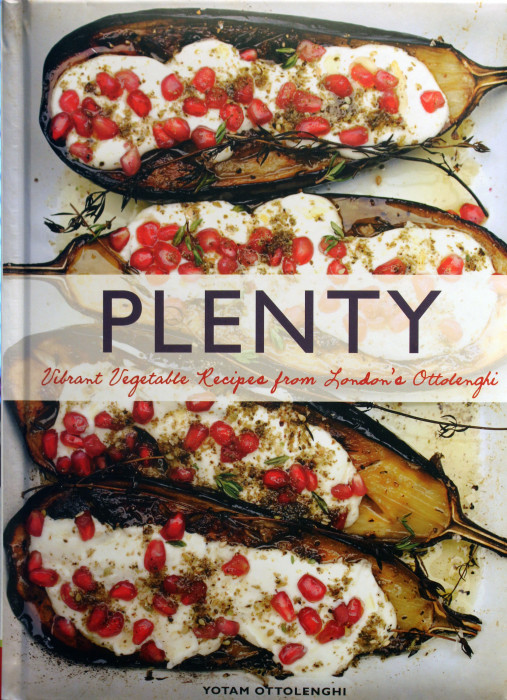By now every foodie know the glories of Yotam Ottolenghi, his food, his restaurant, his books. As his prominence evolved, he was asked in 2006 by the Guardian newspaper to write a “new vegetarian” column. This book, Plenty, is a distillation of the first four years of those columns, with some rewriting of the original recipes. Yotam acknowledges that his perspective, his writing, and his recipes have evolved. Thus, Plenty is filled with great recipes made even greater.
Thing is, Yotam is not a vegetarian. He appreciates that his culinary perspective, his books and restaurant have plenty [no pun intended] to satisfy any vegetarian, but he sees vegetarian dishes as complementary. You can indulge only in them, or combine them with protein-based dishes. For Yotam, what matters is that each dish much stand on its own merits, ascend to excellence based only on its ingredients and special preparation.
So, if a dish just happen to have only vegetable components — no protein —then it is a vegetable dish, incidentally vegetarian, that needs to be supreme. There are 130 recipes in this book. 130 supreme recipes.
The book is organized in fifteen chapters, some a single ingredient and some a complete botanical category. But the signature feature of each of the chapters is a focus on one central flavor that is sophisticated enough to serve as the foundation for the entire dish. The chapters include:
- Roots
- Funny Onions
- Mushrooms
- Zucchini and Other Squashes
- Peppers
- Brassicas
- The Mighty Eggplant
- Tomatoes
- Leaves, Cooked and Raw
- Green Things
- Green Beans
- Pulses
- Grains
- Pasta, Polenta, Couscous
- Fruit with Cheese
That’s a lot of veggie territory and, even if vegetables are not your very most favorite thing, you can find delights here.
The quality and imagination is evident in the very first recipe in the book: Poached Baby Vegetables with Caper Mayonnaise. This is a Mediterranean inspired book so the capers are a given. The vegetables span an entire garden: carrots, fennels, asparagus, zucchini, and leeks. The poaching liquor is Mediterranean, too: white wine, olive oil, lemon juice, bay leaves, and celery. Typical of this book, the list of ingredients is not short. The directions are not brief. The results sublime.
It is hard to decide what is most important about this book: the recipes or the techniques. Yotam’s cleverness is evident in dishes that include:
- Parsnip dumplings in broth
- Caramelized garlic tart
- Fried leeks
- Black pepper tofu
- Roasted butternut squash with sweet spices, lime and green chile
- Crusted pumpkin wedges with sour cream
- Green [spinach] pancakes with lime butter
- Caramelized fennel with goat cheese
- Crunchy papparadelle with panko
- Watermelon with feta
Some of these are immediate and easy: the watermelon with feta. Some are surprising: the parsnip dumplings, or those spinach pancakes. And some will take a bit of time: the roasted butternut squash.
Quick or lengthy, simple or a bit complex, the recipes in Plenty bear Yotam’s signature: his creativity, his devotion to tradition, his joy in experimentation with the new.
Every recipe here is within your reach. You may need some time, some patience, but there is no need for exceptional skills, equipment or ingredients. Just let your imagination be stirred by Yotam’s.
You might have wondered, at times, how anyone could be a vegetarian. Wouldn’t they be missing out on so much? It’s the reverse really. Until you’ve had the chance to sample vegetables prepared in exemplary fashion, you cannot appreciate them. With Plenty, you can.

